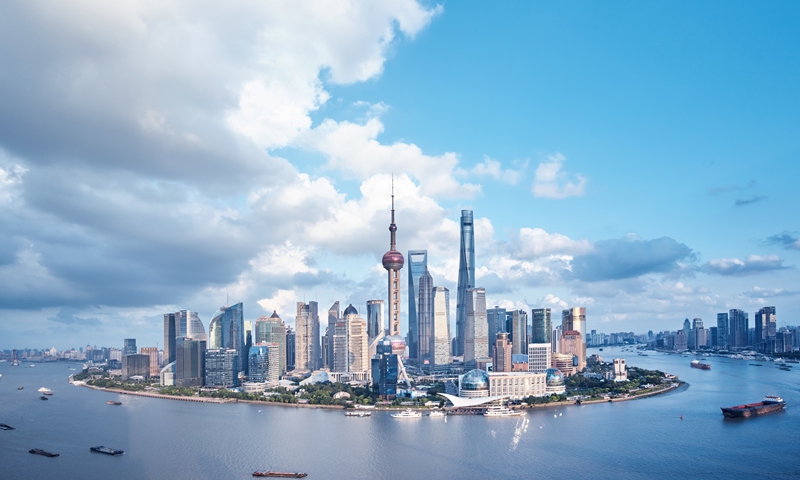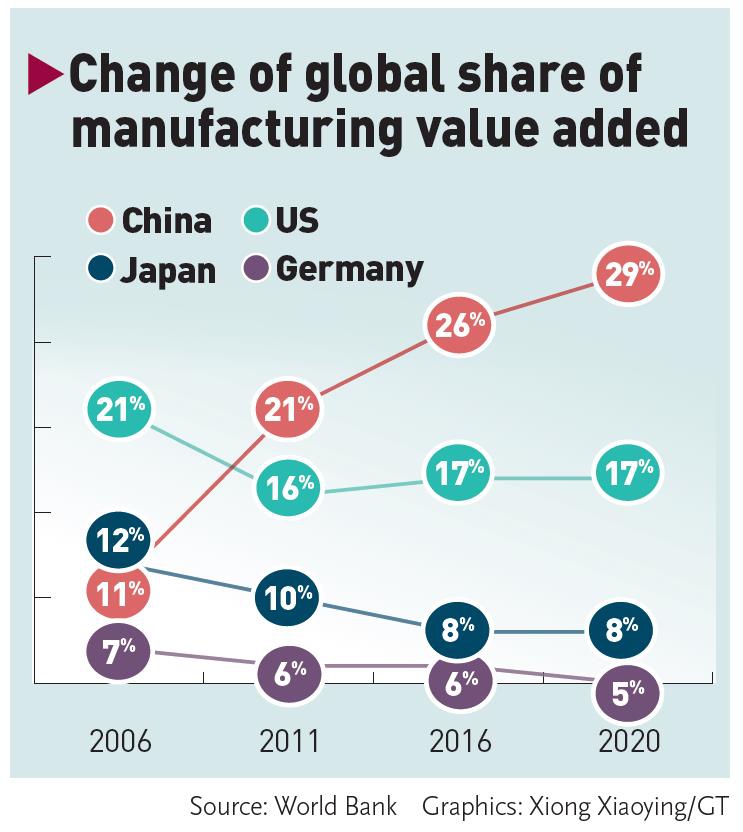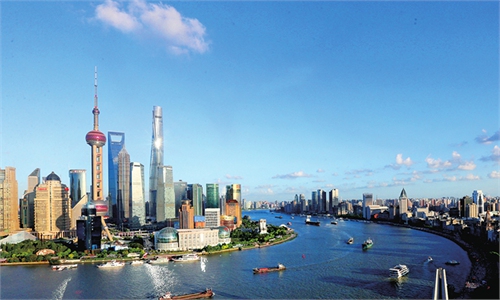Multinationals keep expanding in Chinese market with nearly 100 projects signed at summit
Nearly 100 cooperation projects worth $15.6b signed at summit

A view of the Lujiazui area, a financial zone, in Shanghai Photo: VCG
China remains a strong force in global supply chains, despite temporary COVID-19 disruptions, intensified China-US competition and a reconstruction of the global division of labor, multinationals and industry representatives said at a major multinational summit on Monday.
The discussion and remarks, which came from industry giants with global operations such as Foxconn and Lenovo, also offered the latest rebuttal to some foreign hype that a recent surge in exports from Vietnam was an indicator that supply chains are leaving China due to a loss of appeal.
When it comes to the global division of labor and supply chain transfers, multinational corporations operating in China at different levels should have full confidence in China, Cui Zhicheng, chief commercial officer of the Foxconn Technology Group, said during a forum at the Qingdao Summit held in Qingdao, East China's Shandong Province on Monday.
Cui noted that China's strength in the global industry chain no longer relies on labor costs.
The comprehensive strength and the comprehensive market environment are the areas where China has confidence and resilience.
Multinationals' confidence in the world's second-largest economy is on vivid display at the Qingdao summit, which has attracted more than 5,000 participants both online and on-site, including representatives from 476 Fortune 500 companies and other industry leaders.
A total of 99 key cooperation projects were signed during a ceremony on Monday. The total investment of contracted projects was $15.6 billion, with contracted foreign capital worth $5.31 billion from 16 countries and regions, including South Korea, Japan, the US, the UK and Singapore.
The solid commitment comes amid complicated circumstances such as the rise of trade protectionism, the intensified competition between China and the US, the COVID-19 pandemic and the Russia-Ukraine conflict, and a profound reshaping of the global supply chain.
Participants noted that China's dominance, built up over the years, is very difficult to be shaken by any country, whether in terms of scale or scope.
"When we are talking about the ICT industry chain, at present, China still has the most mature and advanced technological foundation and comprehensive strength. So at least for the foreseeable future, we believe that China still has an irreplaceable advantage in the area," Xu He, chief transformation officer of the global supply chain at Lenovo, told the Global Times at the sidelines of the forum on Monday.
China's manufacturing value-added has ranked first in the world for 12 consecutive years, equivalent to the combined total of the US, Germany and Japan, and it holds an absolute advantage in the world that other countries such as India and Vietnam cannot surpass in the short term, according to a report drafted by the Chinese Academy of International Trade and Economic Cooperation that was released during the summit.

Change of global share of manufacturing value added: China, the US, Germany and Japan Graphic: GT
Citing "incomplete statistics," the report said that China ranks first in the world in the production of more than 220 industrial items, and 90 percent of the world's personal computers, 80 percent of air conditioners, 75 percent of solar panels, 70 percent of cellphones and 63 percent of shoes are produced in China.
Observers also noted that during the process of industrial upgrading, China's traditional advantages such as low factor cost and massive production tend to be weakened. But its huge domestic market, complete industrial supporting capability, continually improved innovation and constantly optimized business environment will boost China's new advantages in global supply chains gradually, which will help multinationals to achieve better development in China.
In particular, high-tech manufacturing and high-tech services are now entering China, Zhang Yansheng, chief researcher of the China Center for International Economic Exchanges, told the Monday forum, adding that new opportunities for foreign firms are embedded in China's climate goal and opening-up strategies.
Tao Lin, vice president at Tesla, said at the opening ceremony that Tesla's Shanghai plant contributed half of the company's global deliveries with output exceeding 480,000 electric vehicles in 2021. The plant has become Tesla's most important export base and production center, delivering high-level Chinese manufacturing to the world.
China's prospects in the digital economy and low-carbon development have brought broad development opportunities to US companies like Honeywell.
Honeywell is optimistic about the opportunities brought by energy, aviation, construction, chemical and other industries to promote energy conservation, emissions reduction and sustainable development, Yu Feng, Honeywell's China president, told the Global Times on Monday.
"It is also important to separate politics and economics. We do not engage in zero-sum games, take all, and politicize the economy. We put more emphasis on more cooperation and openness," Zhang said.
Looking ahead, China will further relax market access, promote fair competition, continuously improve the level of trade and investment liberalization and facilitation, and strive to create a market-oriented, law-based and international business environment, Wang Wenbing, spokesperson of China's Foreign Ministry told a regular press conference on Monday.




